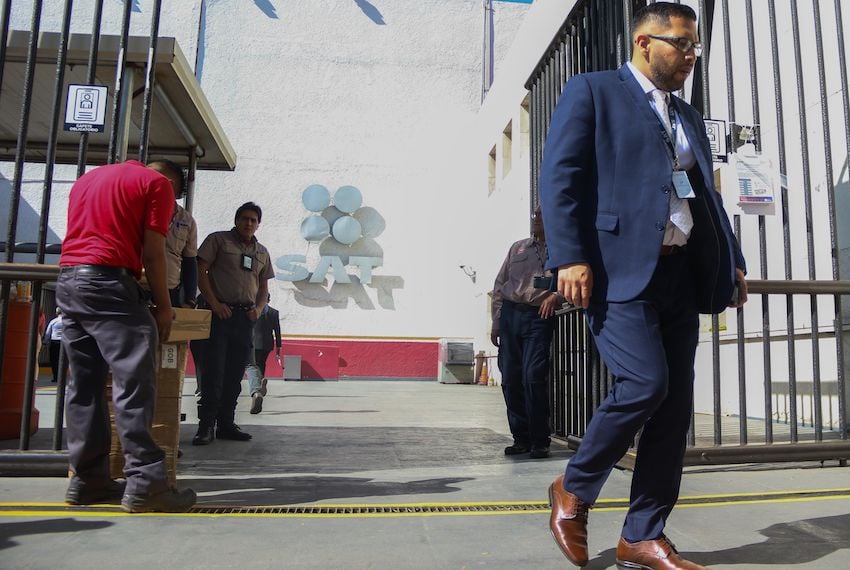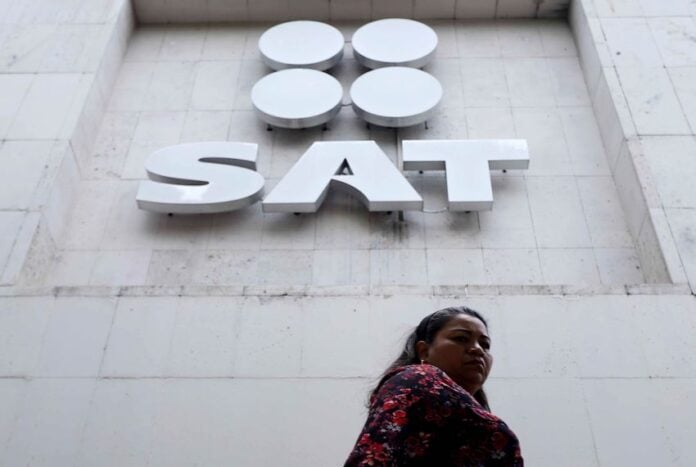The U.S. Chamber of Commerce (USCC) criticized Mexico’s judicial reform and accused the Mexican tax agency SAT of “aggressive and inconsistent tax enforcement practices” in a lengthy document submitted to the Office of the U.S. Trade Representative (USTR).
In response to the USTR’s request for public comments on the USMCA ahead of the 2026 review of the trilateral North American trade pact, the USCC prepared a 39-page document — including a detailed letter — that refers to a wide range of issues and makes a number of recommendations.
In a section of the Oct. 28 document entitled “Factors Impacting the Investment Climate in North America,” the USCC states that the U.S. business community “is facing increased uncertainty that affects companies’ ability to make long-term plans and investment.”
“As previously stated, in Mexico, the recent judicial reform allowing for the direct election of judges has put at risk the government’s obligations to provide to all the right to a competent, independent, and impartial judicial system and raised concerns about investment protections,” the USCC said.
Held on June 1, Mexico’s first-ever judicial elections were extremely contentious, and the turnout was just 13%.
Government critics argued that they would result in the election of judges who lack relevant experience, and who are politically loyal to, or at least sympathetic to, the current federal government and the Morena party founded by former president Andrés Manuel López Obrador.
All nine Supreme Court justices elected on June 1 are affiliated with, seen as sympathetic to, or were at least tacitly supported by Morena.
The USCC also said that U.S. companies are increasingly subject to “practices by Mexico’s tax authority (SAT) that lack transparency and due process and are not consistent with Mexican law or international best practices.”

“These actions create a significant level of uncertainty and risk of unfair penalties — a practice that SAT is using to extract additional revenues,” said the USCC, which describes itself as “the world’s largest business organization.”
“Although the specifics of each case may vary, common practices include unreasonable timeframes for responding, differing or opposing views or criteria for the same issue, and unreasonable levels of documentary proof,” the U.S. Chamber said in a letter signed by Neil Herrington, senior vice president for the Americas Department at the USCC.
“… SAT’s aggressive and inconsistent tax enforcement practices, including excessive audits, denial of inter-company payment deductions, and retroactive penalties, have created uncertainty and increased costs for U.S. businesses,” the USCC added.
“These actions undermine compliance with international best practices and risk invalidating the benefits of the USMCA, necessitating urgent attention to ensure fair and transparent tax administration,” the U.S. Chamber said.
The USCC also asserted that the elimination of independent regulatory bodies “has weakened transparency and regulatory oversight” in Mexico. The Federal Economic Competition Commission and the Energy Regulatory Commission were among seven autonomous bodies that were recently disbanded after Congress approved their abolishment.
The USCC said that “lengthy regulatory delays and burdensome procedures also pose significant market access barriers for U.S. companies operating in Mexico and Canada.”
The Mexican government is aiming to ease such burdens as part of the implementation of its ambitious Plan México initiative.
Additionally, the USCC raised concerns about the recently approved amparo law reform, saying that it “limits the ability of individuals and companies to file injunctions against arbitrary and discretionary decisions from the Mexican State.”
USCC identifies 3 ‘priorities’ for USMCA review
On the first page of its document, the USCC states that “the USMCA has provided substantial benefits to American workers, farmers, ranchers, and companies across the breadth of the U.S. economy.”
“More than 13 million American jobs depend on trade with Canada and Mexico, and the agreement has fostered U.S. economic growth in ways that support many additional high-wage jobs,” the USCC said.
USMCA review will be ‘more bilateral than trilateral,’ says economy minister
It also wrote that Canada and Mexico are “the source of critical imports … that are essential to the competitiveness of U.S. industry.”
“Many of these inputs are unavailable from domestic sources at reasonable prices or in sufficient quantities, and other imports are low-value consumer goods that a high-wage economy such as the United States cannot and should not attempt to produce domestically,” the USCC said.
With regard to the upcoming review of the trade pact that superseded NAFTA in 2020, the U.S. Chamber urged the Trump administration to focus on three objectives, or priorities.
- Priority 1: Maintain and Strengthen U.S. Trade Ties to Canada and Mexico.
- Priority 2: Secure a Renewed Commitment to Full Compliance with the USMCA.
-
Priority 3: Provide Certainty and Confidence to Investors by Expediting a Transparent and Orderly Joint Review.
With regard to “Priority 1,” USCC said that “retaining the trilateral character” of the USMCA is “essential.”
“Business benefits substantially from trade rules that apply broadly and consistently across the breadth of the North American economies; compliance costs soar when inconsistent rules apply in different relationships,” the U.S. Chamber said.
There has been some muted speculation that bilateral trade agreements between the three countries of North America could replace the USMCA, but such an eventuality appears extremely unlikely. However, at least some of the negotiations associated with the USMCA review will take place on a bilateral rather than trilateral basis.
With regard to “Priority 2,” the USCC said it has “long argued that a trade agreement is not worth the paper it is written on without meaningful enforcement.”
The chamber asserted that Mexico “presents compliance challenges in a manner that undermines trade and investment opportunities” for the United States and U.S. companies.
“Mexico presents significant compliance-related challenges in areas including agriculture, digital trade, energy, financial services, intellectual property, regulatory and government procurement, and trade facilitation — including several non-tariff barriers,” the USCC said.
U.S. Trade Representative Jamieson Greer said earlier this month that Mexico is not fully complying with the terms of the USMCA, which U.S. President Donald Trump has violated himself this year by imposing various tariffs on imports from Mexico and Canada.
The Mexican government has acknowledged that its U.S. counterpart has concerns about compliance with the USMCA, and has indicated that it wants to resolve those concerns before the formal commencement of the trade pact review.
Indeed, President Claudia Sheinbaum said earlier this week that negotiations with the U.S. on 54 non-tariff trade barriers were “very advanced.”
With regard to “Priority 3,” the USCC said that “among the chief benefits of the USMCA for the U.S. business community are clear and stable rules of the road.”
“… The agreement has already established strong measures that preserve duty-free trade; streamline customs procedures and commitments on risk assessment and science-based regulation … and facilitate digital trade, among other areas. These areas should, at a minimum, be preserved,” the USCC said.
The USCC’s ‘recommendations for action’
The USCC recommended that the Trump administration “consider a number of modest steps to update some provisions in the USMCA.”
Among its “recommendations for action” were the creation of a trilateral “Committee on Digital Trade to focus on artificial intelligence and trusted technology” and the restoration of “important” intellectual property protections “as originally negotiated” in order to “bring Canada and Mexico closer to the high standard already set in U.S. law.”
While it said it wasn’t “recommending steps to modify the USMCA’s rules of origin,” the USCC said that any changes that are made “should be implemented in a manner that ensures the rules are clear, implementable, minimize trade disruptions, and maintain North American competitiveness.”
By Mexico News Daily chief staff writer Peter Davies (peter.davies@mexiconewsdaily.com)
